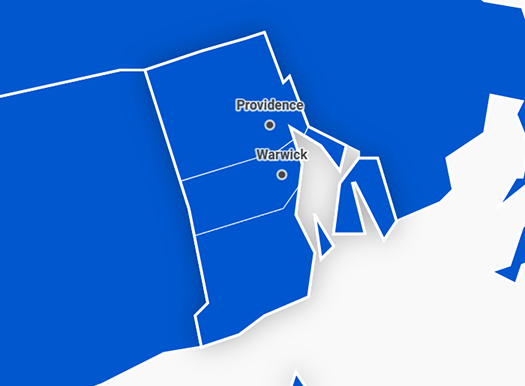
While there were plenty of surprises on the national front, election results in Rhode Island held little drama or surprise. To the extent there are unanticipated results, they are in the margin – although Trump lost, he made a better showing than expected. Patricia Morgan, arguably the most cogent Republican to run for anything in RI, had a remarkable 40% showing against established, proactive and well loved incumbent Sheldon Whitehouse, and there were cities and towns that did go to Trump, beyond Johnston. Other state-wide winners were, predictably, the Democratic candidates by significant margins, including Gabe Amo and Seth Magaziner. The overlay of Trump votes directly reflects the map of towns and cities that rejected bond requests for schools, green spaces and the arts, all of which passed pretty easily state-wide. That’s in keeping with traditional Republican tendencies. The question of whether to have a state constitutional convention, which is required on the ballot every ten years, was roundly defeated. Only Central Falls said yes. The rejections also paralleled the red-blue voting. In other words, the more Republican the town, the stronger the rejection of a constitutional convention. The bluest communities in RI, according to the data available at press time from ri.gov, are led by Block Island. But only 1,400 people live there, about half of whom voted. Next we see Newport, Barrington and Providence. The reddest communities appear to be Foster, followed by Burrilville (as a percent of votes). The overall map kind of parallel the national breakdown – RI is bluest along the coast, and reddest inland. Also bluest in its most affluent sections, but also the most diverse, most urban, and most populated communities.
OPINION
On the national front, it’s going to take some time to process that we have signed up for another four years in a delusional pre-apocalyptic fantasyland. I know the grass was always greener on both sides of the fence back in the day, and that lure of nostalgia is powerful (see “Why Holidays Suck,” page 8), but seriously? The first Trump era was only four years ago, can we as a society really have forgotten the warts so quickly? Plenty of superior pundits will have far more informed analyses in the coming day, but I’d like to highlight two factors this result says about us:
What is wrong with the men in this country? Not all of them, of course, and maybe some women too. We seem to be the only Western nation that cannot abide the idea of a female in charge. With full analysis pending, it’s already clear that men supported Trump vastly more than women. Something frightening is broken there. One of the biggest factors was most certainly not just the economy, but the cognitive dissonance around the economy. If you are trying to pay rent or a mortgage, or you work at a small or mid-size business, you know the struggle is very real right now. Almost everyone is struggling with the day-to-day, yet we’ve been hearing non-stop about how healthy it is. The stock market is hitting record highs, unemployment is low – the inflation index is even far better than the reality most of us encounter each day. Perhaps we are measuring the wrong things and calling them economic health. This has an inevitable “Fuck You” effect, from all the little people to the big businesses, onepercenters and political spinjockies trying to tell us everything is better. It highlights a long-term class/income disparity that Trump will definitely not be remedying. An age-old conflict, but one that’s exaggerated beyond common sense in the US in particular. A conflict that I think will come to a dramatic head sometime in our lifetimes. Finally, most of the economic hardship is a result of events from four and more years ago. The president has an impact on the economy, but other factors have much more pronounced impact, and most of the factors shaping the economy take time to produce results. To borrow an analogy from Obama, it’s like a cruise ship: You can try to guide it, but you can’t just turn it around. In other words, it’s not really fair to hold any president fully accountable for the state of the economy, but to the extent that we can hold them partially accountable, we just re-elected the guy who set the stage for this current economy, and whatever happens with it for the next couple of years will be largely a result of the outgoing administration, but credited to the incoming one. • The opinions expressed here are those of the author and do not necessarily represent those of the magazine, other employees or writers.